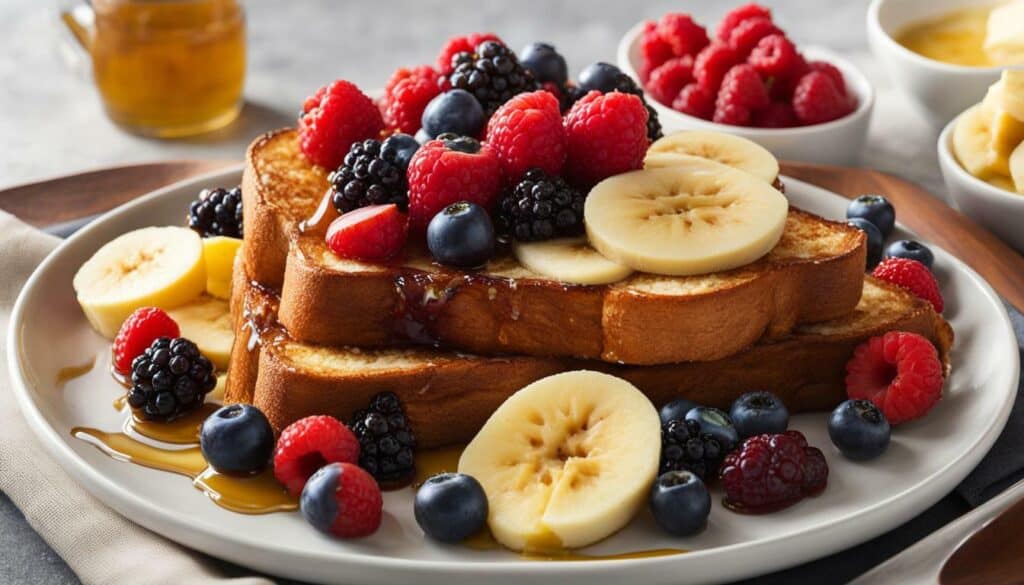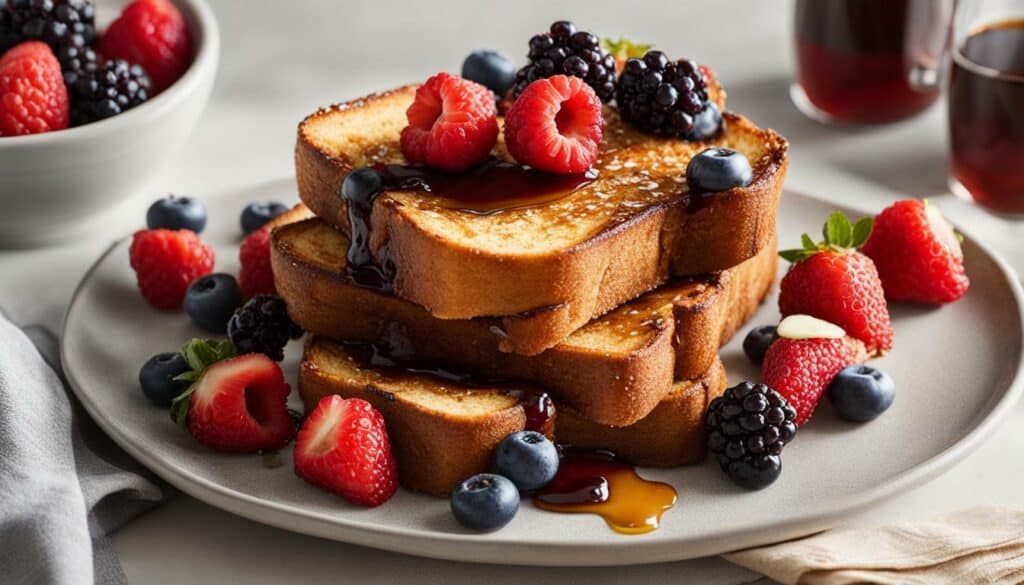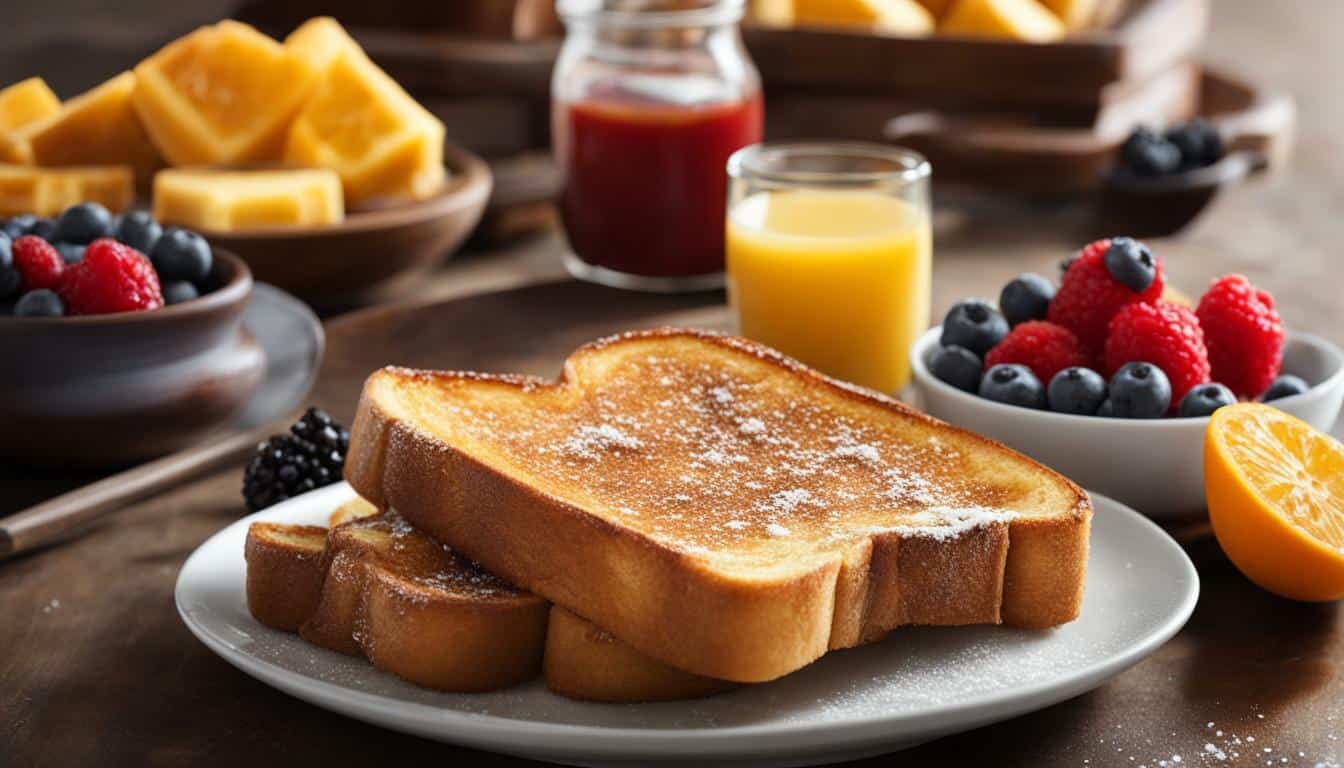French toast is a popular breakfast option enjoyed by many, but have you ever wondered about its nutrition facts? In this section, I will share with you the information you need to know about the nutritional value of this beloved breakfast dish.
- The nutrition facts for French toast can vary depending on the recipe and ingredients used.
- One slice of French toast made with whole wheat bread, eggs, milk, and vanilla extract contains approximately 102 calories, 3g of total fat, 6g of protein, and various other nutrients.
- The calorie and fat content of French toast can vary widely, with lower calorie options available for those looking to make healthier choices.
- It’s important to consider the specific recipe and ingredients used when assessing the nutritional value of French toast.
- By understanding the nutrition facts for French toast, you can make informed choices about including it in your breakfast routine.
Understanding French Toast and Its Ingredients
French toast is typically made from bread, eggs, milk, and various flavorings, which can affect its nutritional profile. When it comes to making healthy French toast, the choice of ingredients and preparation method can make a significant difference in its overall nutritional value. By opting for whole wheat bread, using low-fat milk, and minimizing added sugars, you can enjoy a homemade French toast that is both delicious and nutritious.
Whole wheat bread is a healthier option for French toast as it contains more fiber and nutrients compared to white bread. Fiber aids in digestion and helps to keep you feeling full longer, making it a great choice for a satisfying breakfast. Additionally, whole wheat bread has a lower glycemic index, meaning it can help regulate blood sugar levels more effectively.
When it comes to the eggs and milk used in French toast, choosing low-fat or skim milk can reduce the overall fat content of the dish. Eggs are a good source of protein and essential vitamins, but it’s best to use them in moderation to avoid excessive cholesterol intake. By whisking the eggs and milk together, you can create a creamy mixture that coats the bread evenly, resulting in a delicious French toast.
To add flavor to your French toast, you can use ingredients like vanilla extract, cinnamon, or nutmeg. These flavorings not only enhance the taste but also provide additional health benefits. For example, cinnamon has antioxidant properties and may help lower blood sugar levels. However, it’s important to keep the amount of added sugars in check to maintain a healthy balance.

| Ingredients: | Amount: |
|---|---|
| Whole wheat bread | 2 slices |
| Eggs | 2 |
| Low-fat milk | 1/2 cup |
| Vanilla extract | 1 teaspoon |
| Cinnamon | 1/2 teaspoon |
| Fresh berries (optional) | To taste |
Instructions:
- In a shallow bowl, whisk together the eggs, milk, vanilla extract, and cinnamon.
- Dip each slice of bread in the egg mixture, ensuring both sides are coated.
- Place the coated bread slices on a preheated non-stick skillet or griddle.
- Cook for 2-3 minutes on each side until golden brown.
- Remove from heat and serve with fresh berries if desired.
This healthier French toast recipe provides a balanced combination of fiber, protein, and essential nutrients. By making mindful ingredient choices and following a nutritious preparation method, you can enjoy a homemade French toast that is both delicious and good for you.
A Recipe for Nutritious French Toast
Here’s a delicious and low-calorie French toast recipe you can try at home. This recipe uses whole wheat bread, which adds fiber and nutrients to your breakfast. By swapping out regular bread for whole wheat, you can increase the nutritional value of your French toast without sacrificing taste.
To make this nutritious French toast, you will need the following ingredients:
- 4 slices of whole wheat bread
- 2 large eggs
- 1/2 cup of low-fat milk
- 1 teaspoon of vanilla extract
- A pinch of cinnamon (optional)
Instructions:
- In a shallow bowl, whisk together the eggs, milk, vanilla extract, and cinnamon (if using).
- Heat a non-stick skillet or griddle over medium heat.
- Dip each slice of bread into the egg mixture, making sure both sides are coated.
- Place the coated bread slices onto the heated skillet or griddle.
- Cook for 2-3 minutes on each side, or until golden brown.
- Remove from heat and serve immediately.
Enjoy your nutritious French toast with a drizzle of maple syrup, a sprinkle of powdered sugar, or a dollop of Greek yogurt. You can also add fresh berries or sliced bananas for an extra boost of vitamins and antioxidants. This recipe is a great way to start your day on a healthy and satisfying note!
| Nutrient | Amount per serving (1 slice) |
|---|---|
| Calories | 102 |
| Total Fat | 3g |
| Saturated Fat | 1g |
| Cholesterol | 62mg |
| Sodium | 160mg |
| Carbohydrates | 13g |
| Dietary Fiber | 2g |
| Total Sugars | 2g |
| Added Sugars | 1g |
| Protein | 6g |
| Vitamin D | 1mcg |
| Calcium | 79mg |
| Iron | 1mg |
| Potassium | 126mg |

French toast offers a range of nutrients that contribute to a well-balanced breakfast. This delightful morning meal combines the goodness of whole wheat bread, eggs, milk, and vanilla extract to create a tasty and nutritious dish. Let’s dive into the nutritional value of French toast and explore the essential nutrients it provides.
A typical slice of French toast (approximately 66g) contains 102 calories, 3g of total fat, 1g of saturated fat, 62mg of cholesterol, 160mg of sodium, 13g of carbohydrates, 2g of dietary fiber, 2g of total sugars, 1g of added sugars, 6g of protein, 1mcg of vitamin D, 79mg of calcium, 1mg of iron, and 126mg of potassium. These figures may vary depending on the recipe and ingredients used.
French toast is a good source of protein, which is essential for muscle repair and growth. It also provides carbohydrates, the primary source of energy for our bodies. Additionally, French toast contains important micronutrients like calcium, which contributes to strong bones and teeth, and iron, which helps transport oxygen throughout the body.
| Nutrient | Amount per Slice (66g) |
|---|---|
| Calories | 102 |
| Total Fat | 3g |
| Saturated Fat | 1g |
| Cholesterol | 62mg |
| Sodium | 160mg |
| Carbohydrates | 13g |
| Dietary Fiber | 2g |
| Total Sugars | 2g |
| Added Sugars | 1g |
| Protein | 6g |
| Vitamin D | 1mcg |
| Calcium | 79mg |
| Iron | 1mg |
| Potassium | 126mg |
French toast can be a part of a healthy and balanced diet when enjoyed in moderation. Remember to consider the portion size and ingredients used when calculating the overall nutritional value of your French toast. Adding fresh fruits or a sprinkle of cinnamon can enhance both the flavor and nutritional content of this classic breakfast favorite.

French toast contains a combination of macronutrients that provide energy and support various bodily functions. The main macronutrients found in French toast are protein and carbohydrates. Let’s take a closer look at the nutritional content of these macronutrients in this beloved breakfast dish.
Protein is an essential nutrient that plays a crucial role in building and repairing tissues, as well as supporting the immune system. One slice of French toast can provide approximately 6 grams of protein. This macronutrient helps to keep you feeling satisfied and energized throughout the day.
Carbohydrates, on the other hand, are the primary source of fuel for the body. French toast typically contains around 13 grams of carbohydrates per slice. These carbs are converted into glucose, which is used by the body for energy. They also provide essential dietary fiber, with approximately 2 grams of fiber in a slice of French toast.
It’s important to note that the nutritional content of French toast can vary depending on the recipe and ingredients used. To make a healthier version, you can opt for whole wheat bread, which provides more fiber and nutrients compared to white bread. You can also control the amount of added sugars by using natural sweeteners such as cinnamon or fresh fruit instead of syrup.
Now that we have explored the macronutrients in French toast, let’s move on to the micronutrients and discover the vitamins and minerals that this breakfast dish can contribute to your diet.

| Nutrient | Amount per Slice (Approximately 66g) |
|---|---|
| Calories | 102 |
| Total Fat | 3g |
| Saturated Fat | 1g |
| Cholesterol | 62mg |
| Sodium | 160mg |
| Carbohydrates | 13g |
| Dietary Fiber | 2g |
| Total Sugars | 2g |
| Added Sugars | 1g |
| Protein | 6g |
| Vitamin D | 1mcg |
| Calcium | 79mg |
| Iron | 1mg |
| Potassium | 126mg |
Micronutrients in French Toast
French toast can also be a source of important vitamins and minerals that are essential for our well-being. Let’s take a closer look at the micronutrients that can be found in this delicious breakfast dish.
One of the key vitamins in French toast is vitamin D. This vitamin plays a crucial role in the body’s absorption of calcium, promoting strong and healthy bones. With just one slice of French toast, you can get 1mcg of vitamin D, which is approximately 5% of the recommended daily intake.
In addition to vitamin D, French toast is also a good source of calcium. Calcium is vital for maintaining strong bones and teeth, as well as supporting proper muscle and nerve function. One slice of French toast provides 79mg of calcium, contributing to your daily calcium needs.
When it comes to minerals, French toast contains iron and potassium. Iron is essential for the production of red blood cells and the transportation of oxygen throughout the body. With approximately 1mg of iron per slice, French toast can help you meet a small portion of your daily iron requirements. On the other hand, potassium is important for regulating fluid balance, muscle contractions, and maintaining a healthy blood pressure. A slice of French toast offers around 126mg of potassium.

In conclusion, French toast not only satisfies our taste buds but can also provide us with valuable micronutrients. With its contribution to vitamin D, calcium, iron, and potassium, French toast can be a tasty and nutritious addition to our breakfast table.
French Toast and Dietary Considerations
If you have dietary restrictions, there are options available to enjoy French toast while adhering to your dietary needs. Whether you’re following a gluten-free diet or have other specific requirements, you can still savor this classic breakfast dish.
For those with gluten sensitivities or celiac disease, gluten-free French toast is a delicious alternative. Instead of using traditional wheat bread, opt for gluten-free bread made from ingredients like rice, quinoa, or almond flour. You can find gluten-free bread varieties in many grocery stores or even make your own at home.
If you’re looking to reduce your sugar intake, you can sweeten your French toast with natural alternatives like maple syrup or honey instead of traditional sugar. These options add flavor without the excessive sugar content. Additionally, you can experiment with different spices like cinnamon or nutmeg to enhance the taste without adding extra calories or sugar.
For those watching their calorie intake, you can make healthier French toast by using whole wheat bread, which contains more fiber and essential nutrients compared to white bread. Additionally, you can substitute whole milk with low-fat or plant-based alternatives like almond milk or soy milk. These swaps can help reduce the calorie content without compromising on taste.
| Dietary Restriction | Options |
|---|---|
| Gluten-Free | Gluten-free bread made with rice, quinoa, or almond flour |
| Reduced Sugar | Natural sweeteners like maple syrup or honey, and spices like cinnamon or nutmeg |
| Low-Calorie | Whole wheat bread, low-fat or plant-based milk alternatives |
Remember, French toast can be customized to fit different dietary needs, allowing you to enjoy a delicious and satisfying breakfast while staying true to your health goals. Explore these alternatives and experiment with various ingredients to find the perfect combination that suits your requirements.

French toast offers versatility, and there are various ways to modify the recipe to suit your preferences and dietary goals. Whether you’re looking for a healthier option or want to experiment with unique flavors, there’s a French toast recipe out there for everyone. Let’s explore some variations that you can try:
- Whole Wheat French Toast: Substitute white bread with whole wheat bread for a more nutritious option. Whole wheat bread is higher in fiber and provides a heartier texture to your French toast.
- Low-Calorie French Toast: If you’re watching your calorie intake, consider using egg whites instead of whole eggs. This reduces the fat content while still providing the necessary protein.
- Gluten-Free French Toast: For those with gluten sensitivities or a gluten-free diet, opt for gluten-free bread and use alternative milk options like almond or coconut milk.
- Stuffed French Toast: Get creative by adding a delicious filling to your French toast. Some popular options include cream cheese, Nutella, or fresh fruit preserves.
Remember, the nutrition facts for French toast can vary depending on the specific recipe and ingredients used. To make an informed choice, it’s essential to consider the nutritional content and adjust the recipe accordingly. Here’s a table summarizing the nutritional value of a typical French toast recipe:
| Nutrient | Amount per Serving |
|---|---|
| Calories | 102 |
| Total Fat | 3g |
| Saturated Fat | 1g |
| Cholesterol | 62mg |
| Sodium | 160mg |
| Carbohydrates | 13g |
| Dietary Fiber | 2g |
| Total Sugars | 2g |
| Protein | 6g |
| Vitamin D | 1mcg |
| Calcium | 79mg |
| Iron | 1mg |
| Potassium | 126mg |
Remember, these values are approximate and can vary depending on the specific recipe and ingredients used. It’s always a good idea to check the nutrition facts label for the specific products you’re using. With these variations in mind, you can enjoy your French toast while making choices that align with your dietary needs and preferences.

By understanding the nutrition facts of French toast, you can make informed choices about your breakfast and enjoy it as part of a healthy lifestyle.
The nutritional value of French toast can vary depending on the recipe and ingredients used. According to a provided recipe, one slice of French toast made with whole wheat bread, eggs, milk, and vanilla extract contains approximately 102 calories, 3g of total fat, 1g of saturated fat, 62mg of cholesterol, 160mg of sodium, 13g of carbohydrates, 2g of dietary fiber, 2g of total sugars, 1g of added sugars, 6g of protein, 1mcg of vitamin D, 79mg of calcium, 1mg of iron, and 126mg of potassium.
It’s important to note that the nutrition facts can vary depending on the specific recipe and ingredients used. Another source provides a range of nutrition information for French toast, with the low range being approximately 700 calories, 30g of total fat, 14g of saturated fat, 445mg of cholesterol, 730mg of sodium, 79g of carbohydrates, 5g of dietary fiber, 17g of sugar, and 34g of protein. The high range for French toast is approximately 1000 calories, 59g of total fat, 24g of saturated fat, 495mg of cholesterol, 1380mg of sodium, 79g of carbohydrates, 5g of dietary fiber, 7g of sugar, and 34g of protein.
Remember, moderation is key when enjoying French toast. By making conscious choices about the ingredients and portion sizes, you can indulge in this delicious breakfast treat without compromising your health goals. So go ahead, savor your French toast and start your day off right!
FAQ
Q: What are the nutrition facts for French toast?
A: The nutrition facts for French toast can vary depending on the recipe and ingredients used. However, one slice of French toast (approximately 66g) typically contains 102 calories, 3g of total fat, 1g of saturated fat, 62mg of cholesterol, 160mg of sodium, 13g of carbohydrates, 2g of dietary fiber, 2g of total sugars, 1g of added sugars, 6g of protein, 1mcg of vitamin D, 79mg of calcium, 1mg of iron, and 126mg of potassium.
Q: Is French toast a healthy breakfast option?
A: French toast can be a healthy breakfast option when prepared using whole wheat bread, eggs, and milk. By avoiding excessive added sugars and using nutritious ingredients, you can enjoy a balanced meal that provides essential nutrients.
Q: How many calories does French toast typically contain?
A: The calorie content of French toast can vary depending on the recipe and serving size. Generally, French toast can range from approximately 700 to 1000 calories per serving, depending on the ingredients and toppings used.
Q: Can French toast fit into a low-calorie diet?
A: Yes! French toast can be made to fit into a low-calorie diet by using whole wheat bread, egg whites, and low-fat milk. By choosing healthier ingredients and controlling portion sizes, you can enjoy French toast as part of a balanced meal.
Q: What are some alternatives for dietary restrictions?
A: For individuals with dietary restrictions, there are alternative options for enjoying French toast. For example, gluten-free bread can be used to make gluten-free French toast, and dairy-free milk can be used for those who are lactose intolerant or follow a vegan diet.
Q: Are there healthier alternatives to traditional French toast?
A: Yes, there are healthier alternatives to traditional French toast. You can use whole grain bread, substitute sugar with natural sweeteners like honey or maple syrup, and incorporate fruits as toppings to add nutritional value to your French toast.
How Many Carbs Are in a Serving of French Toast?
A delicious deep-dive into french toast carbs reveals that the carb content can vary depending on the ingredients used and the size of the serving. Traditional French toast made with white bread, eggs, and milk can have around 20-25 grams of carbs per slice. However, using whole wheat bread or adding toppings like syrup or fruits can increase the carb count. It’s important to consider portion sizes and any additional ingredients to accurately gauge the carb content in a serving of French toast.





Leave a Reply